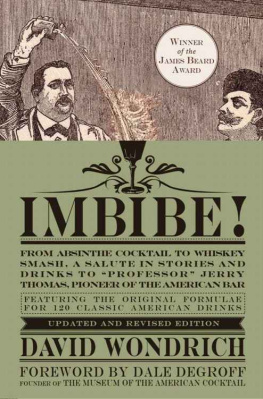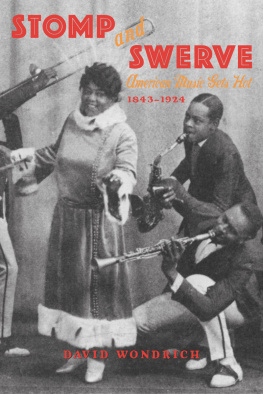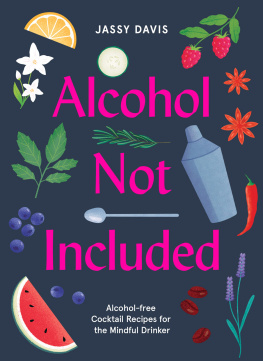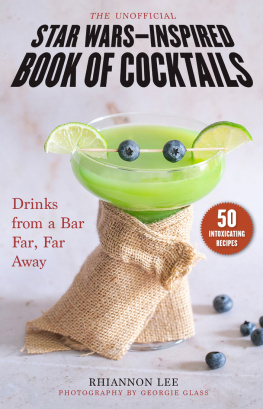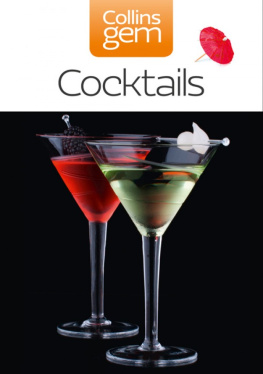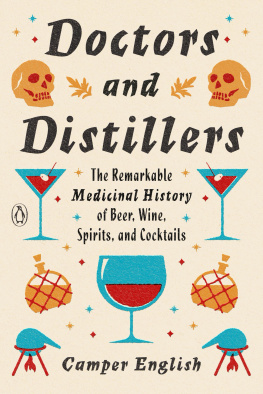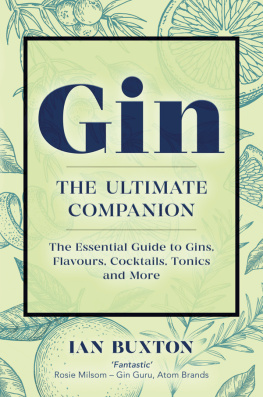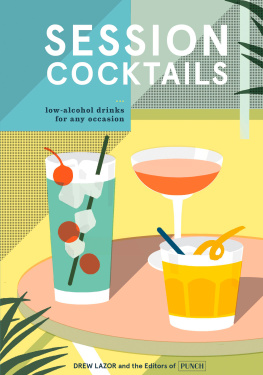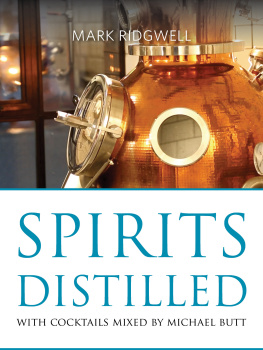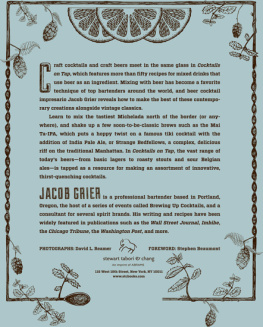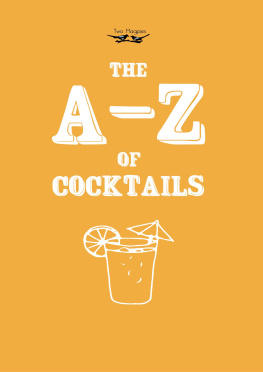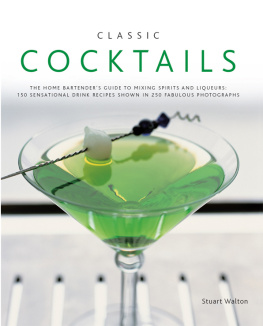THE OXFORD COMPANION TO SPIRITS AND COCKTAILS
EDITORIAL BOARD
Editor-in-Chief
David Wondrich, PHD
Associate Editor
Noah Rothbaum
Area Editors
David Arnold
David Broom
Lew Bryson
Paul Clarke
Doug Frost, MS, MW
Alexandre Gabriel
David Mahoney
Garrett Oliver
Matthew Rowley
Audrey Saunders
Frederick Smith, PHD

Oxford University Press is a department of the University of Oxford. It furthers the Universitys objective of excellence in research, scholarship, and education by publishing worldwide. Oxford is a registered trade mark of Oxford University Press in the UK and certain other countries.
Published in the United States of America by Oxford University Press
198 Madison Avenue, New York, NY 10016, United States of America.
Oxford University Press 2022
All rights reserved. No part of this publication may be reproduced, stored in a retrieval system, or transmitted, in any form or by any means, without the prior permission in writing of Oxford University Press, or as expressly permitted by law, by license, or under terms agreed with the appropriate reproduction rights organization. Inquiries concerning reproduction outside the scope of the above should be sent to the Rights Department, Oxford University Press, at the address above.
You must not circulate this work in any other form and you must impose this same condition on any acquirer.
Library of Congress Cataloging-in-Publication Data
Names: Wondrich, David, editor. | Rothbaum, Noah, editor.
Title: The Oxford companion to spirits and cocktails /
editor in chief, David Wondrich, associate editor, Noah Rothbaum.
Description: New York, NY, United States of America :
Oxford University Press, [2022] | Includes index. |
Identifiers: LCCN 2021033610 (print) | LCCN 2021033611 (ebook) |
ISBN 9780199311132 | ISBN 9780190670405 (epub) |
ISBN 9780190670399 (pdf)
Subjects: LCSH: Cocktails. | LCGFT: Cookbooks.
Classification: LCC TX951 .O99 2021 (print) | LCC TX951 (ebook) |
DDC 641.87/4dc23
LC record available at https://lccn.loc.gov/2021033610
LC ebook record available at https://lccn.loc.gov/2021033611
DOI: 10.1093/acref/9780199311132.001.0001
Contents
APPENDIX 1
APPENDIX 2
APPENDIX 3
Throughout my career as a chef, Ive noticed many similarities between mixology and cooking. When building cocktails, you have different ingredients and spirits that you layer to evoke an emotion, a feeling, or a story. There is history and tradition in each of those parts, magic in their alchemy, and creativity coming from behind the bar, all into one glass. Dave Wondrich, Noah Rothbaum, and these amazing contributors have brilliantly succeeded in capturing all that in this informative and engaging guide that people will refer to time and time again.
These experts (and my NYC neighbors) were able to boil down the distillation, fermentation process, history, and consumption of spirits in all of its complexities in one compelling and definitive read. This deep dive into the origin of spirits and cocktails will enable you to enhance your drinking experience by learning about not only the broad cultures they stem from but the specific bartenders behind the worlds most popular drinks.
I typically drink cocktails when celebrating with family, friends, and loved ones as we gather around and break bread. What I find most enjoyable when pairing cocktails with food is how it can bring an added dimension to the dining experience by introducing those bitter, sweet, salty, sour, or umami notes. With the help of the Oxford Companion, these drinks will transport you to different periods of time and countries around the world without you leaving your bar stool. Crack these pages and delve into everything from the history of Grey Goose, to the lore of moonshine, to what makes the Paloma cocktail so singular, to exploring the role of the Stork Club and the history of the spirits trade, to name a few. Like me, I hope youll get lost in the pages of this book, which will take you beyond your taste buds on a delicious journey.
Marcus Samuelsson
Distillation is much older, more widespread, and easier than most people, including many historians, realize. Spreading the technology of it, which tends to be regarded as some arcane alchemy that requires years of apprenticeship to master, can be as simple as by telling someone that if they boil their local beer or wine and collect the first part of the steam, they will end up with something stronger, easier to transport, and far less likely to turn into vinegar. As for that steam collecting: you dont need an expensive, elaborately worked copper still, complete with complex condensing coil, to do it. It has been done with two clay bowls and a swatch of tree bark, or a clay pot, the bottom of another, broken one, and a bamboo tube, orwell, there are as many ways as there are human imaginations.
As a result, the world of spirits is vast: they can be, and have been, made from anything that has some kind of sugar in it, or even starch that can be converted to sugar. The raw material doesnt have to taste good; a great deal of perfectly clean spirit is made from beet molasses, the foul muck left over from extracting the sugar from sugar beets. But you dont even have to distill and filter a questionable-tasting spirit to neutrality to make it palatable; sometimes all you have to do is stick it in a wooden barrel and forget about it for a few years, or simply mix it with some citrus juice and sugar, or a healthy splash of ginger ale.
The Oxford Companion to Spirits and Cocktails is our quixotic attempt to squeeze this whole world of spirits between the covers of a book. And by whole world we do mean whole world: here you will find detailed coverage of not just cognac and scotch whisky or London dry gin, bourbon, and Caribbean rumthe types of spirits youll find in any halfway-decently stocked liquor storebut also of Philippine lambanog and Nigerian ogogoro, Maryland peach brandy, Indian feni, and Chinese baijiu. The things that a great many people around the world drink but which dont make it to Duty Free. To the best of our knowledge, nobody has been foolhardy enough to try that since Samuel Morewood back in 1838, at least not in any detail.
But the books title isnt the Oxford Companion to Spirits; its the Oxford Companion to Spirits and Cocktails, which means it also encompasses how spirits are consumed. Unlike beer and wine, spirits are most commonly mixed into various delightful little potions, not poured straight from the bottle. To cover the fermentation (all spirits begin with fermentation), distillation, and maturation that go into making spirits without also covering the mixology that completes the circuit between the maker and the consumer seems wrong. So spirits and cocktails (a term we are using in its loosest sense, to cover any mixed drink based on spirits, plus a few key fellow travelers). That means not only origin stories of the various popular mixtures, each with a recipe, but also biographies of famous bartenders and histories of influential bars. Most influential bartenders make their marks on the world not by writing books or talking to the press but one interaction at a time, one customer at a time. Their drinks and their bars are their resumes, and we are proud to present a great deal of new information on both, along with detailed looks at things such as the various bar tools, the techniques of mixing drinks, and even the theories that underpin the art (it does have them).


